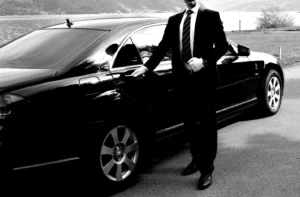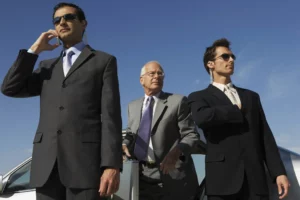Imagine this. You’re the CEO of a large corporation, constantly under the public eye, moving from one high-stakes meeting to another. Your schedule is demanding, and the nature of your work makes you a potential target for threats. In such a scenario, your safety is not just a personal concern; it also directly impacts your company’s stability. This is where the Executive Protection Agency comes into play.
Executive Protection Agencies are specialized firms offering security solutions for high-ranking individuals, celebrities, corporate executives, and others with elevated personal risk. These professionals, often from law enforcement or military backgrounds, are trained to mitigate risks, manage emergencies, and ensure the personal safety of the individuals they’re protecting.

Choosing the right Executive Protection Agency, however, is not as simple as picking a name out of the phone book. It requires careful consideration and an in-depth understanding of several factors. Making the wrong choice could mean risking not only your personal safety but also your reputation and, in some cases, the wellbeing of your family and your business.
The aim of this article is to provide you with a comprehensive guide on how to make this critical choice. We will delve into aspects such as understanding your unique needs, evaluating the reputation and track record of the agency, assessing their expertise and experience, considering the breadth of their service offerings, and understanding their adherence to legal and ethical standards. All these factors, when examined carefully, will lead you towards an agency that aligns perfectly with your needs.
So, let’s get started and navigate through this decision-making process together.
Understanding your unique needs
Before embarking on the mission of finding the perfect executive protection agency, it’s crucial that you take the time to fully comprehend your unique security needs. This understanding forms the foundation on which your decision will rest. It’s akin to having a roadmap to guide your journey through the vast and often complex terrain of security agencies. Here’s how you can go about identifying these unique requirements:
Analyze your daily activities
Start by thoroughly assessing your daily routine. Look at the places you visit regularly, the people you interact with, and your standard modes of transport. These factors can significantly impact your security needs. For instance, if you frequently travel by private jet, you might need an agency experienced in securing private airfields and coordinating with aviation security. Similarly, if you often attend high-profile events or meetings, you might need an agency with expertise in event security and crowd control.
Identify your potential risks
The level of threat you face can vary dramatically based on your profession, public status, and even geographic location. High-ranking executives, celebrities, or political figures might face more severe or specific threats compared to others. Conducting a comprehensive threat assessment can help identify your potential risks, which may include stalkers, kidnapping threats, corporate espionage, or even cyber threats.
Consult with security professionals
Getting an expert’s perspective is always a good idea. Security professionals can provide valuable insights and help identify blind spots in your security assessment. They can conduct a detailed risk assessment, suggest suitable security measures, and guide you in understanding the type of protection services you require.
Assess your personal comfort and privacy preferences
While safety is paramount, your comfort and privacy are equally important. Consider what level of security presence you’re comfortable with. Some people prefer a visible security presence as it serves as a deterrent, while others might prefer a more discreet approach to maintain their privacy.
As an example, consider the case of a high-profile tech entrepreneur living in Silicon Valley. The executive, we’ll call him Mike, was receiving threatening emails from an unknown source. Upon consulting with a security professional, Mike realized he needed an executive protection agency that could not only provide personal protection but also had the expertise in cybersecurity to track and neutralize the source of the threats. He also preferred a low-profile approach to his security, as he valued his privacy and didn’t want an overt security presence to disturb his daily life.
By understanding his unique needs, Mike was able to narrow down his choices and focus on agencies that offered the specific services he needed, saving him time and ensuring a better fit.
Remember, the key to choosing the right executive protection agency lies in understanding what ‘right’ means for you. It’s about finding a security solution that fits like a glove, offering optimum protection while aligning perfectly with your lifestyle and preferences.
Agency’s reputation and track record

When it comes to safeguarding your personal security, reputation isn’t just about glossy brochures or polished sales pitches. It’s about a proven track record of providing efficient, reliable, and effective security services.
The reputation of an executive protection agency is built over years of consistent performance. It’s about trust and credibility earned by delivering on promises time and time again. Let’s discuss some factors you can consider to gauge an agency’s reputation and track record.
Client Feedback and Reviews
Much like you’d check reviews before buying a new gadget or trying a new restaurant, you should look for reviews and feedback about the executive protection agency. Online platforms, professional networks, and industry forums can provide a wealth of information.
Don’t just stop at the overall ratings; delve deeper into the comments to understand the specifics of what the agency did well and where they fell short. A pattern of positive feedback and client satisfaction is a strong indicator of a reputable agency.
Past Performance and Case Studies
A competent agency will have a portfolio of case studies demonstrating their expertise and experience. These case studies can provide insights into the agency’s ability to handle complex situations, their problem-solving skills, and their adaptability to unexpected challenges.
However, keep in mind the confidentiality aspect of this profession. Some agencies may not disclose detailed case studies due to privacy agreements with clients, but they should still be able to share some anonymized or generalized examples of their work.
Long-Term Client Relationships
A testament to an agency’s reputation is their ability to maintain long-term relationships with their clients. It speaks volumes about the agency’s consistency in delivering quality services. If an agency has clients who have stuck around for a considerable period of time, it’s a good indication that the agency is reliable and trustworthy.
Industry Recognition and Certifications
Awards, industry recognitions, and certifications can also lend credibility to an agency. These recognitions are a testament to their commitment to excellence and adherence to industry best practices.
Expertise and experience

Experience is an invaluable asset in the realm of executive protection. An agency that’s been in the field for a while has likely faced a variety of situations, learned from those experiences, and refined its methodologies. Expertise, on the other hand, relates to the specialized knowledge and skillset an agency possesses in providing executive protection. Let’s explore these important aspects further.
Years in Business and Range of Experience
While the number of years in business isn’t the only measure of an agency’s capability, it can be a reliable indicator of their stability and experience. An agency with a long-standing presence in the industry is likely to have weathered various challenges and evolved its techniques and strategies accordingly.
Look for agencies with a broad range of experience across different industries and scenarios. They are more likely to adapt quickly to your unique situation and provide robust protection.
Specialized Training and Skills
The world of executive protection requires more than basic security training. Agencies should provide their personnel with specialized training, which could encompass advanced driving techniques, first-aid and emergency response, threat assessment, surveillance detection, and even cultural sensitivity training for those operating in different countries.
Enquire about the type of training the agency’s personnel undergo and ensure it aligns with your specific needs. An agency committed to the continuous learning and training of its personnel is a promising choice.
Experience in Similar Scenarios
An agency that has experience dealing with risks similar to those you face can be particularly beneficial. They’ll be well-versed in the nuances of such situations and will be able to provide an efficient response. For instance, if you’re facing threats from obsessive fans, an agency that has previously worked with celebrities facing similar issues would be a suitable choice.
In essence, the expertise and experience of an executive protection agency are fundamental to providing efficient, effective, and tailor-made security solutions. It’s not just about how long they’ve been in the game but also about how well they’ve played it and, most importantly, how well they can play it for you.
Availability and responsiveness

A pivotal factor that often gets overlooked when choosing an executive protection agency is the agency’s availability and responsiveness. In the dynamic world of personal protection, crises don’t adhere to a 9-to-5 schedule. They can occur unexpectedly and at any time. Thus, it’s essential for the agency you choose to be available and responsive around the clock.
24/7 support
Look for an agency that offers 24/7 support. This doesn’t only mean physical protection, but also being able to reach out to them for advice or assistance at any time. Whether it’s a late-night security concern or a last-minute change in your travel plans that requires an immediate adjustment in your protection detail, you need an agency that is always ready to support you.
Quick Response Time
In the face of a threat, every second counts. An agency’s ability to respond quickly to a situation can be the difference between a contained incident and a full-blown crisis. Make sure the agency has systems in place to respond swiftly and effectively to emergencies. This could include a dedicated emergency hotline, quick deployment of resources, and protocols for fast decision-making.
Flexibility to accommodate changes
Life is unpredictable, and so is the schedule of a busy executive. The agency you choose should be flexible enough to accommodate changes in your plans and respond proactively to shifts in your risk profile. A rigid agency that struggles with changes could potentially put your safety at risk.
Final thoughts

Choosing the right executive protection agency is not a decision to be taken lightly. It’s about entrusting your safety to an external entity, and you need to make sure you’re putting your trust in the right hands. As we’ve explored in this article, several factors should guide your choice, each playing a crucial role in ensuring your security needs are met efficiently and effectively.
Understanding Your Unique Needs: This is where it all begins. A clear comprehension of your daily activities, potential risks, comfort, and privacy preferences helps lay the groundwork for identifying the kind of protection you need.
Agency’s Reputation and Track Record: An agency’s reputation and track record are invaluable insights into their competence and credibility. Look out for client feedback, past performance, long-term client relationships, and industry recognition as indicators of their reputation.
Agency’s Expertise and Experience: An agency’s expertise and experience provide you with assurance that they have the necessary skills and knowledge to handle various situations. Consider their years in business, specialized training, and experience in similar scenarios to yours.
Availability and responsiveness: Finally, in the unpredictable and dynamic world of personal protection, the availability and responsiveness of your executive protection agency are crucial. They should be available 24/7, able to respond quickly to emergencies, and flexible to accommodate changes.
At the end of the day, the right executive protection agency for you is one that meets your unique needs, has a solid reputation and proven track record, boasts relevant expertise and experience, and is always available and responsive. Remember, this decision is not just about securing your peace of mind; more importantly, it’s about securing your life. So take your time, do your research, and make a choice that ensures your safety is never compromised.

